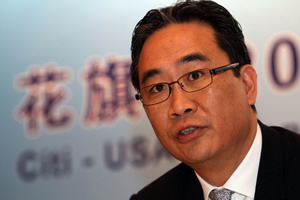Citi to make hay while the sun shines
Updated: 2011-12-09 08:09
By Wang Xiaotian (China Daily)
|
|||||||||||
|
Andrew Au says uncertainties of global and Chinese economies will not affect Citi's long-term investment in China. [Photo / Provided to China Daily] |
Foreign banks still have plenty of room for development in the Chinese market and it is unrealistic to expect them to achieve a large market share in only 10 years, said a senior executive at the China division of Citigroup Inc.
Andrew Au, chief executive officer in China of the US financial services giant and chairman of Citibank (China) Co Ltd, made the remarks in an exclusive interview with China Daily.
Foreign banks in China have been working hard to define their role in the market and to expand their operations ever since China joined the World Trade Organization (WTO) 10 years ago, according to a report released by PricewaterhouseCoopers (PwC) International Ltd in June.
The 127 foreign players' overall market share only accounted for 1.83 percent in 2010, the report found.
Au said in such a big market it would be unrealistic to expect foreign players' market share to increase to 20 percent from zero in 10 years.
"China is a very big market, and 10 years is not a very long time," he said. "It's not practical to expect foreign institutions to have a large market share. You don't see that in other countries either."
Au said for the multinationals, business took off quickly after China joined the WTO and, compared with 10 years ago, there is a much-increased level of interest in the Chinese market among foreign financial institutions.
"The number of foreign financial institutions and their employees in China have both gone up dramatically. It's a very vibrant market now," he said.
By the end of 2010, 185 foreign banks had set up offices in China. Thirty-seven locally incorporated foreign banks had established 223 branches while 74 foreign banks set up 90 branches, according to China Banking Regulatory Commission (CBRC).
The total assets of foreign banks grew steadily between 2003 and 2007, stalled in 2008 and 2009 at the time of China's stimulus plan, and grew again in 2010.
By the end of 2010, foreign banks had set up outlets in 45 cities across China, 25 more than at the beginning of 2003.
"The Chinese banking market is already the largest banking market in the Asia Pacific based on external studies. And it is still growing at a very rapid pace," Au said.
"Given the fact that foreign banks' market share is still relatively small, there is a lot of room for those like us, who have what it takes to compete successfully, to do very well in China in the future."
Among the 42 foreign banks surveyed by PwC, 22 expected revenue to rise between 20 and 50 percent in 2011. All the banks believed their revenue will continue to grow over the next three years.
Au said he hopes foreign players will be permitted to do more business in the future, and Citi China is confident about getting a meaningful share of the market.
Citi's investment in China will continue, and rising uncertainties in the global and Chinese economies will not affect the lender's expansion in China, said Au.
"China is one of our most important markets in the world," he said. "We have a history of more than 100 years and a well-defined long-term strategy in China, which will not be affected by short-term events and the economic cycle."
Citi China has accelerated its network expansion in recent years. Since last year, it opened branches in Guiyang, Nanjing, Changsha, and Wuxi.
With the opening of the Wuxi branch on Nov 3, Citi had 13 corporate bank branches and 45 consumer bank outlets in China.
"In the cities where we already have our presence, we will continue to extend our retail networks," Au said.
The company will also set up "China Desks" around the world to serve Chinese customers who are traveling overseas, he said.
The lender has already set up eight China Desks staffed by native Mandarin speakers in markets such as South Africa, Nigeria, Dubai, London, New York and Singapore.
"Our China Desk initiative is part of our intention to make sure our clients in China continue to be served in the way they deserve," Au said.
With strong competition from major Chinese banks and the high cost of developing extensive outlets, some foreign players have chosen to quit the consumer banking sector and pay more attention to fields such as investment banking. Au denied that Citi thinks that way: "There is no question about our commitment to the consumer banking business."
Au said Citi has a very vibrant institutional business and its consumer banking arm is growing in China. He said Citi will continue to focus on multinationals that have a presence in the country, large State-owned enterprises, private enterprises, small and medium-sized enterprises (SMEs) and financial institutions, as well as individuals.
Citi China has opened four lending companies that offer both secured and unsecured loans for individual borrowers and SMEs in some underdeveloped areas.
"We are extremely mindful that the vitality of economic development to some extent has been dependent on the growth of the SME sector," Au said. He also noted that Citi China's strong liquidity and strength in services such as cash management, trade finance, foreign exchange risk management and interest risk management will secure it a strong presence in the SME sector.
It is also gearing up to take full advantage of the rapid capital market development in China.
In June, it set up a joint venture with Chinese securities firm Orient Securities Co Ltd, which enables it to underwrite stocks and bonds for companies and provide domestic advisory services on mergers and acquisitions.
Citi China realized a net profit of 871 million yuan ($137 million) in 2010, up by 19 percent compared with one year earlier.
Related Stories
Foreign banks remain optimistic over expansion in China 2011-10-20 09:23
Foreign banks lower China's growth forecast 2011-07-14 13:21
Citi to form China securities venture 2011-06-01 15:01
Citi plans more investment in branch network 2011-04-01 13:15
- Chinese shares close lower after data release
- Passengers prepare for annual peak
- Home appliance sales in rural China up 66% in Nov
- Collective wage talks promoted
- Good things in store for Chinese life insurers
- Dotcom could fall into disuse
- Global supermarkets conquer China
- China's Nov CPI up 4.2%, PPI up 2.7%









